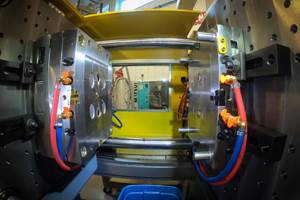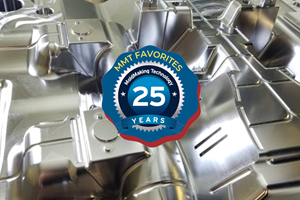International trade policy impacts every mold builder, and policy shifts matter even more. Each decision potentially makes it easier or more difficult for a mold builder to export or to push back against unfair trade practices originating overseas. After a year of laying out a comprehensive, and very controversial, trade agenda, the Trump administration began to implement dramatic shifts in 2018. Our nation has plenty of policy irons in the fire, including unilateral tariffs on steel and aluminum imports, a new NAFTA and face-to-face negotiations with Beijing.
Here’s a quick rundown of some of the decisions that the government will need to make, along with some of the issues it needs to address this year.
Completing the U.S.-Mexico-Canada Agreement
The U.S., Mexico, and Canada signed the NAFTA update, called USMCA, but the deal now faces scrutiny from the U.S. Congress to determine if they will approve it or not. Although the President spent the first half of his term governing as a deep-red conservative, his negotiators, led by U.S. Trade Representative Robert Lighthizer, fashioned this deal with the prospect of a divided Congress in mind. As a result, some of its more notable updates could help gain bipartisan support.
The USMCA includes an increase in the percentage of North American content an automobile must contain to qualify for duty-free status. This item is an improvement that will keep more automotive parts manufacturing in the trade zone. The deal also stipulates that 30 percent of cars must be made by workers who earn at least $16 an hour. That is a rule that will mean more automotive manufacturing in the U.S. and will simultaneously encourage the low-wage Mexican automotive industry to improve the pay of its manufacturing workforce.
Another rule prohibits the USMCA signatories from signing a bilateral trade deal with any non-market economies, which leads to the next outstanding issue in American trade politics: U.S./China negotiations.
Insert your priorities into the discussion by inviting your members of Congress or staff to visit your shops, so they can learn more about your value to the community and how policy decisions impact you.
U.S./China Negotiations
The purpose of the aforementioned USMCA rule is to secure America’s economic backyard while the U.S. tries to reshape an increasingly lopsided trading relationship with the world’s second-largest individual economy. China’s economic growth can be described in exponential numbers, and explicitly so since 2000 when Washington granted the nation permanent normalized trade relations and assisted the nation joining the World Trade Organization.
The liberalization that China promised in return for this fiscal bonanza didn’t materialize, and a decline in American manufacturing employment correlates to the increasing Chinese trade deficit since that year. According to a recent report from the Economic Policy Institute, that deficit can be linked to 2.5 million lost manufacturing jobs from 2001 to 2017, which is simply a jaw-dropping figure. And in the plastics and rubber products industry alone, the deficit eliminated more than 78,000 jobs.
A combination of lax American trade enforcement and bald-faced Chinese mercantilism increased the U.S. deficit and caused major job loss. This outcome has made the significant tariffs the Trump administration erected very appropriate, although some exemptions, such as those granted to injection mold imports, were wisely applied.
As Washington and Beijing continue to deal, here are a few fundamental issues that U.S. negotiators should insist their counterparts in China address:
- Dismal intellectual property protection for foreign firms and a habit of currency manipulation, which subsidizes the country’s export industries and levies a tax on competitive imports;
- State-owned enterprises, some of which are actively seeking footholds in the American marketplace, particularly in railcar and bus manufacturing;
- The complete absence of formal labor protections for its massive workforce; and,
- Nonexistent environmental regulations.
Another ongoing trade deal is one with the European Union, the now post-Brexit U.K. Still another is with Japan, as Tokyo’s economic growth model is export-based with a very lucrative automotive market that is notoriously closed, while Japanese automakers are fully integrated into the American marketplace. That market will take significant muscle to pry it open.
It will be an interesting year for our unsubtle President as he wrestles with the newly divided Congress, even more so now than when his party ran both chambers. The brisk pace at which he’s forcing a reckoning on trade policy may make for some interesting headlines in 2019.
Not only will it be important for moldmakers to stay ahead of them, but it’s also incumbent on shops to make their voices heard in these policy debates. Insert your priorities into the discussion by inviting your members of Congress or staff to visit your shops, so they can learn more about your value to the community and how policy decisions impact you.
About the Author
Scott Paul
Scott N. Paul is president of the Alliance for American Manufacturing
Related Content
Transforming Moldmaking into Digital Industrial Manufacturing
Moldmaking and digitalization is at the core of this global industrial manufacturing company’s consolidation and diversification plan.
Read MorePredictive Manufacturing Moves Mold Builder into Advanced Medical Component Manufacturing
From a hot rod hobby, medical molds and shop performance to technology extremes, key relationships and a growth strategy, it’s obvious details matter at Eden Tool.
Read MoreMaking Quick and Easy Kaizen Work for Your Shop
Within each person is unlimited creative potential to improve shop operations.
Read MoreLeading Mold Manufacturers Share Best Practices for Improving Efficiency
Precise Tooling Solutions, X-Cell Tool and Mold, M&M Tool and Mold, Ameritech Die & Mold, and Cavalier Tool & Manufacturing, sit down for a fast-paced Q&A focused on strategies for improving efficiencies across their operations.
Read MoreRead Next
Reasons to Use Fiber Lasers for Mold Cleaning
Fiber lasers offer a simplicity, speed, control and portability, minimizing mold cleaning risks.
Read MoreHow to Use Continuing Education to Remain Competitive in Moldmaking
Continued training helps moldmakers make tooling decisions and properly use the latest cutting tool to efficiently machine high-quality molds.
Read MoreAre You a Moldmaker Considering 3D Printing? Consider the 3D Printing Workshop at NPE2024
Presentations will cover 3D printing for mold tooling, material innovation, product development, bridge production and full-scale, high-volume additive manufacturing.
Read More









.jpg;maxWidth=300;quality=90)

_300x250 4.png;maxWidth=300;quality=90)














